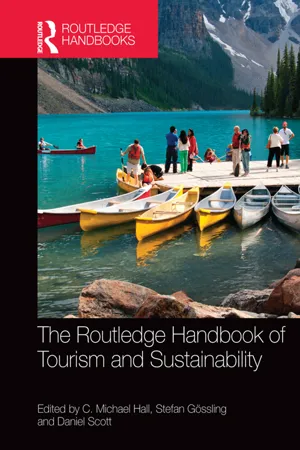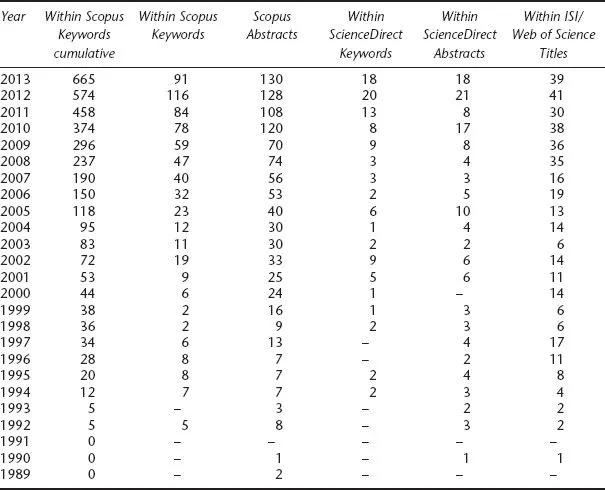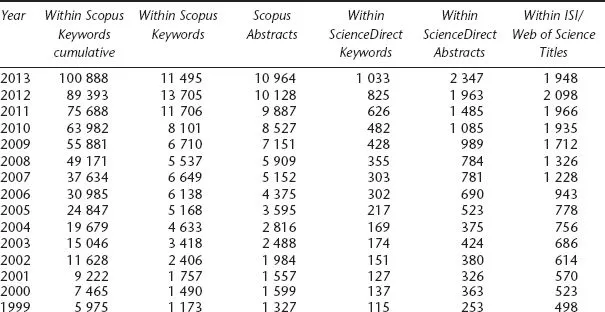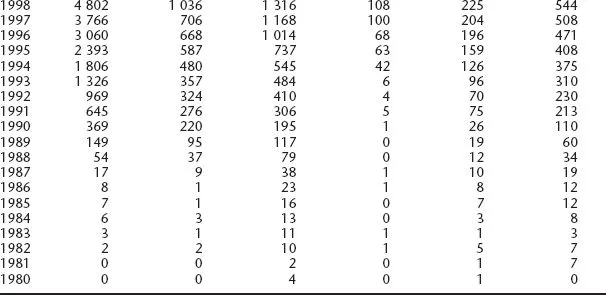![]()
1
Tourism and sustainability
An introduction
C. Michael Hall, Stefan Gössling and Daniel Scott
Sustainable development ‘Development that meets the needs of the present without compromising the ability of future generations to meet their own needs’ (World Commission on Environment and Development [WCED] 1987: 49).
Sustainable tourism is a sub-set of sustainable development. Sustainable tourism is a tourism system that encourages qualitative development, with a focus on quality of life and well-being measures, but not aggregate quantitative growth to the detriment of natural capital.
Wicked planning problem A ‘Wicked problem’ is a phrase originally used in social planning to describe a problem that is difficult or impossible to solve because of incomplete, contradictory and changing requirements that are often difficult to recognise. The term ‘wicked’ is used to denote resistance to resolution. Moreover, because of complex interdependencies, the effort to solve one aspect of a wicked problem may reveal or create other problems. Climate change has been described as a ‘super wicked problem’ characterised by (a) lack of time; (b) no central governance authority; (c) those seeking to solve the problem are also causing it; and (d) policies which discount the future irrationally (Levin et al. 2012).
Introduction
Although the notion of sustainable development is now integral to tourism, policy and management, the concept has a long history. Indeed, the political and economic debate over the way in which sustainability should be defined, developed and implemented is a reflection of longstanding differences between different members of society over the best use of resources in industrial society. These debates are, in turn, bound up within the wider frameworks of attitudes towards the environment that exist both in contemporary society and, just as importantly, over time (Leiserowitz, Kates & Parris 2005; Dobson 2007). Although environmental issues are now taken for granted as a policy-making concern, it needs to be remembered that the ‘age of ecology’ is arguably a very recent phenomenon, with the first environmental protection agencies not being established until the late 1960s and early 1970s (Glacken 1967; Worster 1977). That the Earth has firmly entered the Anthropocene – an era that demarks a substantial global impact of humans on planetary environmental systems comparable in scale to those associated with significant perturbations of the geological past – is an even more recent realisation (Crutzen 2002). However, as central as the environment is to notions of sustainability, any understanding of the concept of sustainable development in relation to tourism also needs to chart the interrelationships between environmental, social and economic thought. This first chapter introduces the reader to this volume, its structure and some of the issues that it discusses.
Sustainable development and sustainable tourism
The famous Brundtland definition, that ‘sustainable development is development that meets the needs of the present without compromising the ability of future generations to meet their own needs’ (World Commission on Environment and Development (WCED) 1987: 49), has come to feature in many tourism textbooks, journal articles and student essays, even though tourism was hardly mentioned in the report. Yet neither sustainable development nor sustainable tourism began with the WCED. Variations of the concepts had been in existence for many years (Worster 1977; Redclift 1987; see Chapter 2). Yet, they are not just abstract academic ideas; they are concepts which trickle down and affect the day-to-day lives of everyone on the planet, even if people never realise it (Mercer 2000).
Sustainability is an ‘essentially contested concept’ (Gaillie 1955–56); that is, a concept the use and application of which is inherently a matter of dispute. The reason for this is the degree to which the concept is used to refer to a ‘balance’ or ‘wise’ use in the way in which natural resources are exploited. The appropriateness of such an approach and the very way in which ‘wise use’ is defined will depend on the disparate values and ideologies of various stakeholders (Mercer 2000; Runte 2010). However, the history of natural resource management suggests that sustainable development is another term which has emerged in an attempt to reconcile conflicting value positions with regard to the environment and the perception that there is an environmental problem which requires a solution (Saarinen 2006; also see Chapter 2) at one time regional or national in scope, but now recognised as global (see Chapter 3).
Academic adoption of ‘sustainable tourism’ and ‘sustainable development’
As Hall (2011) suggested, the notion of sustainable tourism must be regarded as one of the great success stories of tourism research and knowledge transfer. It has become incorporated into the fabric of tourism discourse in academic, business and governance terms. In addition to a specific academic journal (Journal of Sustainable Tourism), there are numerous dedicated texts and readers (e.g. Hall & Lew 1998; Mowforth & Munt 1998; Swarbrooke 1999; Aronsson 2000; Ritchie & Crouch 2003; Weaver 2006; Gössling, Hall & Weaver 2009) as well as a steadily increasing number of academic articles. Table 1.1 illustrates the growing significance of sustainable tourism and sustainable development in tourism as an area of academic interest as evidenced by the number of times the term ‘sustainable tourism’ has been used in abstracts, keywords or titles in three major databases of academic literature from 1980 to 2013. For reasons of comparison, Table 1.2 illustrates the number of times that ‘sustainable development’ and ‘sustainability’ have been used. Both tables show the relative recency of the terms in academic discourse, in great part because of the impact of the WCED (1987) on thinking about resource use and the environment, including with respect to tourism (Bramwell & Lane 1993). In addition, the tables also show that interest in sustainable tourism constitutes only a very small part of the overall sustainable development literature.
Table 1.1 Records of the term ‘sustainable tourism’ in major academic databases 1980–2013
Table 1.2 Records of the term ‘sustainable development’ or ‘sustainability’ in major academic databases 1980–2013
Searches undertaken 1 June 2014.
Adoption of ‘sustainable tourism’ by the public and private sectors
At the same time that sustainable tourism has grown as an area of academic interest, the term been increasingly adopted into tourism policy-making by both the public and private sectors at all levels of governance. For example, the concept of sustainable tourism has been at the forefront of the policy statements of organisations such as the United Nations Environment Programme (UNEP) (2005a, 2005b, 2005c, 2009), United Nations World Tourism Organization (UNWTO) (2007, 2010) and the World Travel and Tourism Council (WTTC) (2003, 2009, 2010), as well as joint exercises between them (e.g. International Task Force on Sustainable Tourism Development 2009; United Nations Environment Programme and the World Tourism Organization 2005; World Travel & Tourism Council, International Federation of Tour Operators, International Hotel & Restaurant Association, & International Council of Cruise Lines 2002). The concept is also mentioned in most national or regional government tourism policies or statements (e.g. Department for Culture, Media and Sport Tourism Division 2005; Hawaii Department of Business, Economic Development and Tourism 2005; Industry Canada, 2006; Ministry of Tourism, Tourism New Zealand, & Tourism Industry Association New Zealand 2007; Department of Resources, Energy and Tourism 2008; South Australian Tourism Commission 2009; USAID 2007) as well as corporate statements (e.g. Tourism Industry Association of Canada 2010; TUI Travel PLC 2010).
Despite the success of the concept of sustainable tourism in academic and policy discourse, tourism’s contribution to environmental change, one of the benchmarks of sustainability in terms of the maintenance of ‘natural’ or ‘ecological’ capital (Pearce, Barbier & Markandya 1990; WCED 1987), is greater than ever as tourism continues to grow. Table 1.3 provides an outline of international tourism arrivals and forecasts for the period 1950–2030.
Table 1.3 International tourism arrivals and forecasts 1950–2030
Source: World Tourism Organization 1997; UN World Tourism Organization 2006, 2012
Gössling (2002) provided the first comprehensive overview of the global environmental consequences of tourism and argued that, from a global perspective, tourism meaningfully contributes to: changes in land cover and land use; energy use; greenhouse gas emissions; biotic exchange and extinction of wild species; exchange and dispersion of diseases; and changes in the perception and understanding of the environment (see also Chapter 3). Gössling’s (2002) estimates for 2001 with respect to tourism’s contribution to global environmental change (updated in Gössling & Hall (2006)) have been more recently examined by Hall and Lew (2009). They suggest that the contribution of tourism to global change is continuing to grow as a result of increasing numbers of domestic and international tourist trips, greater transport connections between climatically similar regions; increasing energy and water intensity of luxury tourism experiences and consumables (mainly imported food and beverages), as well as increases in distance travelled (Tatem & Hay 2007; Gössling, Peeters & Scott 2008; United Nations World Tourism Organization, United Nations Environment Programme & World Meteorological Organization (UNWTO, UNEP & WMO) 2008; Tatem 2009; Gössling, Hall, Peeters & Scott 2010; Dubois, Peeters, Ceron & Gössling 2011; Scott, Gössling & Hall 2012).
The extent of tourism’s contribution to global change is outlined further in Chapter 3. However, to fully understand the interrelationships between tourism and sustainability it is important to look at both conceptual, managerial and policy uses of the term.
The policy problem attributes of sustainable tourism: Implications for approaches
Sustainability is a ‘wicked’ or meta-policy problem that has led to new institutional arrangements and policy settings at international, national and local scales. Sustainable tourism is a sub-set of this broader policy arena, with its own specific set of institutions and policy actors at various scales, as well as being a sub-set of tourism policy overall (Hall 2011). Sustainability problems may also pose different challenges than other policy problems (e.g. education, taxation, health) because of its attributes (Butler 1991; Dovers 1996; Hall & Lew 1998, 2009; Gössling & Hall 2006; Hall 2008, 2011) including:
• Temporality – Natural systems function over timescales that are often vastly greater than those which determine political and policy cycles (i.e. electoral terms) and business cycles and planning (i.e. quarterly reporting and annual shareholder meetings).
• Spatiality – Sustainability and environmental problems tend to be cross-boundary in nature and for some types of problems (e.g. climate change, deforestation, and biodiversity loss) global in scale. One of the most significant forms of spatial problem in sustainability is the mismatch between government, regulatory and jurisdictional space, and ecological/environmental boundaries; this greatly complicates the management of certain issues (e.g. watershed and species habitat).
• Limits – The concept of sustainabili...




